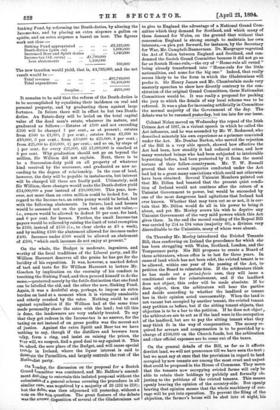On laeaday, the discussion on the proposal for a Scotch
Grand1 '-,trimittee was continued, and Mr. Balfour's amend- mentdec a,ing to entertain this isolated proposal without the submissica of a general scheme covering the procedure in all similar cas4, was negatived by a majority of 33 (252 to 219); but the debtie was then adjourned till yesterday, without a vote on the iktin question. The great feature of the debate was the avowe disposition of several of the Gladstonians not to give to England the advantage of a National Grand Com- mittee which they demand for Scotland, and which many of them demand for Wales, on the ground that without that concession England is strong enough to maintain her own interests,—a plea put forward, for instance, by the Secretary for War, Mr. Campbell-Bannerman. Dr. Macgregor regretted the Act of Union between England and Scotland, and con- demned the Scotch Grand Committee because it did not go as. far as Scotch Home-rule,—the cry of "Home-rule all round " being already transformed into "Home-rule for the little• nationalities, and none for the big one." Indeed, that really seems likely to be the form in which the Gladstonians will prefer it. Sir Henry James and Mr. Chamberlain made very- masterly speeches to show how directly contrary to the con- stitution of the original Grand Committees, these Nationalist. Committees would be. It was really a proposal for packing the jury to which the details of any local scheme was to be referred. It was a plan for increasing artificially in Committee the normal majority of the Government of the day. The debate was to be resumed yesterday, but too late for our issue.


































 Previous page
Previous page